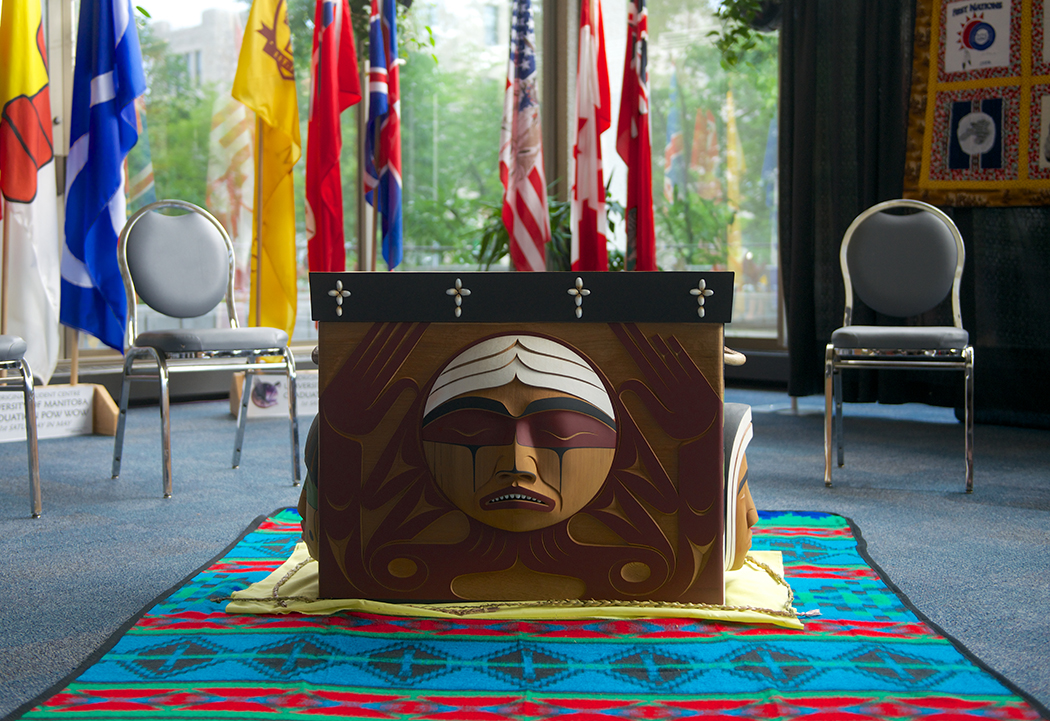
NEWS RELEASE: Governing Circle announced the National Research Centre for Truth and Reconciliation
The members of the Governing Circle of the National Research Centre for Truth and Reconciliation (NRCTR) at the University of Manitoba were announced today by director Ry Moran.
The seven-member Governing Circle is comprised of: three members representing Survivors, their families or descendants (one First Nations, one Inuit and one Métis); two members from NRCTR partner organizations and two members from the University of Manitoba.
“With our Governing Circle members in place, we are that much further along in building the strong team we need to ensure this most important and sensitive collection of records is handled with the utmost of respect.” said Moran. “I am excited to begin work with this excellent group of people.”
The inaugural Governing Circle members are:
Eugene Arcand, a Cree from Muskeg Lake First Nation in Saskatchewan. Eugene Arcand spent 10 years at the St. Michael Indian Residential School in Duck Lake and one year at the Lebret Students Residence, both in Saskatchewan. For nearly four decades, he has served the Saskatchewan First Nations community in a variety of capacities, particularly with the Federation of Saskatchewan Indian Nations as an Education Liaison Worker, an executive assistant for the North Battleford District, and as an elected Vice-Chief.
Andrew Carrier is a Survivor of a Catholic boarding school. He has over 30 years of volunteer experience within Métis, First Nation and Persons with Disability non-profit organizations such as the Indian Métis Friendship Centre, the Canadian Paraplegic Association, the Manitoba Métis Federation and the Indigenous Leadership Development Institute.
Dr. Catherine Cook, associate dean, First Nations, Métis and Inuit Health, College of Medicine, Faculty of Health Sciences, University of Manitoba; and vice-president, Population and Aboriginal Health, Winnipeg Regional Health Authority. Dr. Cook is a Métis family physician originally from the Interlake region of Manitoba. She graduated from the Faculty of Medicine in 1987 and has since become a recognized leader in the field of Aboriginal health care in Manitoba.
Grand Chief Edward John (Akile Ch’oh) is a Hereditary Chief of Tl’azt’en Nation located on the banks of the Nak’al Bun (Stuart Lake) in northern BC. Chief John has been a lawyer for more than 30 years. He is currently serving his tenth consecutive term on the First Nations Summit Task Group (political executive), which is mandated to carry out specific tasks related to Aboriginal Title and Rights negotiations with British Columbia and Canada and other issues of common concern to First Nations in British Columbia.
Gregory Juliano, associate vice-president (human resources), University of Manitoba. A lawyer by profession, he oversees the human resource requirements of the University of Manitoba. Throughout his career, he has had a professional interest in human rights issues, and has been an active advocate for respect, diversity and equity issues both at the University and in the larger community. He participated in the team that successfully bid to bring the NRCTR to the University, and led the negotiation of the associated agreements with the Truth and Reconciliation Commission.
Jennifer Watkins is a young Inuk woman who advocates for the Inuit. Born, raised and educated in Kuujjuaq, Quebec, she attended John Abbot College and Concordia University, and speaks Inuktitut, English and French. Ms Watkins is the Director of Inuit Values and Practices at the Nunavik Regional Board of Health and Social Services. She is also is an Executive Member of the Kativik Regional Government, a member of the Kuujjuaq Municipal Council and the President of Tungasuvik, the Kuujjuaq women’s shelter.
Dr. Cynthia Wesley-Esquimaux, vice-provost (Aboriginal initiatives), Lakehead University. An intergenerational Survivor, she serves as a Status Only Assistant Professor at the Factor-Intwentash Faculty of Social Work at the University of Toronto, an adjunct assistant professor at Carleton and Lakehead Universities, and a board member at Healthy Minds Canada. A member of the Chippewa of Georgina Island First Nation in Lake Simcoe, Ontario, she has dedicated her life to building bridges of understanding between people.
The Governing Circle ensures Indigenous control over the materials held by the NRCTR. It provides guidance on the centre’s policies, priorities and activities, on ceremonies and protocols, on methods and sources for expanding the centre’s holdings and resources, and on prospective partners. Members of the Governing Circle serve two-year terms and at all times, at least four members of the Governing Circle must identify as Aboriginal.
“We as survivors have been waiting for this centre for a long time” says Eugene Arcand, a 12-year survivor of the residential schools. “Ensuring survivors have a say in how the centre functions is critical and I am honoured to be a part of it.”
English: umanitoba.ca/nrctr Français: umanitoba.ca/cnrvr
For further information contact Ry Moran, director, National Research Centre for Truth and Reconciliation, at: 204-474-6069, or email: Ry.Moran@umanitoba.ca






